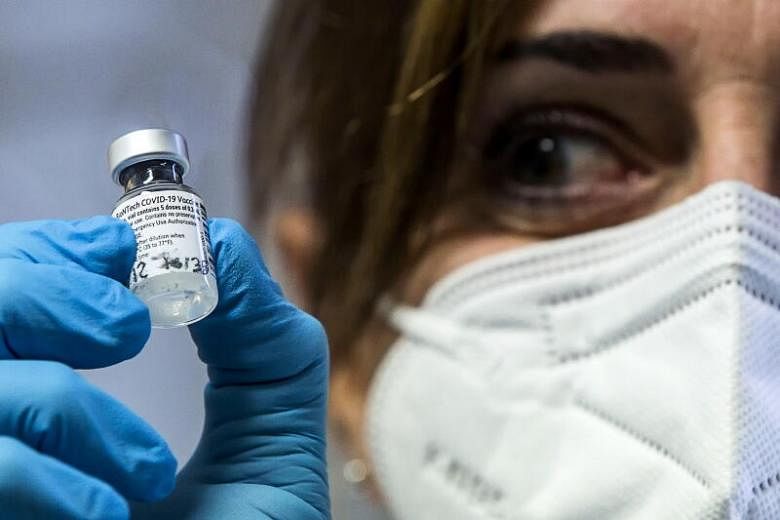NEW YORK (REUTERS) - As millions of people await their turn to get a Covid-19 vaccine that could be months away, scammers online - in e-mails and on messaging apps - are luring victims with claims that they can deliver shots within days for as little as US$150 (S$198).
Covid-19 vaccine scams are on the rise, according to European and United States government officials who are warning the public of fraudsters out for money and personal data.
A search online, in Dark Web forums and on messaging app Telegram found seven different offers for alleged Covid-19 vaccines.
Scams include e-mails promising entry to supposedly secret lists for early vaccine access and robocallers impersonating government agencies. Message boards on the so-called Dark Web have added Covid-19 vaccines to more traditional illicit goods for sale.
The US Federal Bureau of Investigation (FBI) and Interpol, among others, have warned of emerging pandemic-related fraud schemes, saying false cures and vaccines advertised on fake websites could pose cyber threats and a significant risk to peoples' health, or even lives.
Website domains containing the word vaccine, in combination with Covid-19 or coronavirus, more than doubled since October to roughly 2,500 in November, when the first legitimate vaccines were nearing regulatory approval, according to cyber-security firm Recorded Future, which is tracking Covid-19 fraud online.
"So far a lot of these domains just appear to be opportunistic registrations, but some are going to be used for phishing attempts to have people click on (malicious) links," said Ms Lindsay Kaye, director of operational outcomes at Recorded Future.
Ms Kaye said her team, which also scours the Dark Web, so far has not come across any legitimate vaccine diverted from healthcare facilities or national stockpiles.
The scams are preying on concerns about the far slower-than-promised roll-out of vaccines to protect against the virus that has claimed more than 1.8 million lives worldwide so far. Most people will likely have to wait well into spring, or even summer, to get their shot.
In the US, only about 4.5 million people had received their first shot as at Monday, the US Centres for Disease Control and Prevention reported. That is a fraction of the 20 million who were supposed to have been vaccinated by the end of 2020, according to earlier government forecasts.
Vaccines, guns and money
On Dark Web forum Agartha, fake Covid-19 vaccines were offered next to cocaine, opioid medication, "super high-quality fake money", hand guns and gift cards. Posts showed stock photos of vaccines and offered vials for US$500 and US$1,000, or the equivalent in Bitcoin.
On another Dark Web site, a seller claiming to be from the "Wuhan Institute of Science" offered Covid-19 vaccines in exchange for a donation, and asked buyers to provide their medical history.
On Telegram, several channels claimed to offer Covid-19 vaccines, accompanied by stock images. One user offered supposed Moderna vaccines for US$180, and claimed the vaccine from Pfizer and BioNTech could be had for US$150, and AstraZeneca's for US$110 per vial.
Asked how the vaccines would be shipped, the account creator said they were transported in "regulated temperature packs" and ice packs within a few days, or overnight for an additional charge.
Actual Covid-19 vaccines, particularly the Pfizer/BioNTech offering, must be temperature controlled to remain effective, with drugmakers equipping shipments with temperature trackers to ensure the cold chain. Vaccine shipments and distribution are also tightly controlled by officials and will be administered at no cost.
The US has so far authorised two Covid-19 vaccines for emergency use - the ones from Pfizer-BioNTech and Moderna. To date, the European Union has authorised the Pfizer-BioNTech vaccine and is expected to clear the Moderna vaccine this week.
Britain has already authorised those two and just added the vaccine developed by Oxford University with AstraZeneca.
Asked about vaccine scams, Pfizer said it has taken meticulous steps to reduce the risk of counterfeiting and tracked trends very carefully.
"Patients should never try to secure a vaccine online - no legitimate vaccine is sold online - and only get vaccinated at certified vaccination centres or by certified healthcare providers," a Pfizer spokesman said in a statement.
Moderna referred a request for comment to the US Department of Health and Human Services (HHS), which did not respond. AstraZeneca did not respond to a request for comment.
The HHS, FBI and US Department of Justice have urged the public to report any Covid-19 vaccine scams, including people asking for out-of-pocket payments for the vaccine and online vaccine advertisements.











